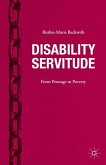Sexuality, Disability, and the Law approaches issues of sexual autonomy and disability from multiple perspectives, including constitutional law, international human rights, therapeutic jurisprudence, history, cognitive psychology, dignity studies, and theories and findings on gender constructs and societal norms. Perlin and Lynch determine that if our society continues to assert that persons with mental disabilities possess a primitive morality, we allow ourselves to censor their feelings and their actions. By denying their ability and desires to show love and affection, we justify this disparate treatment. Our reliance on stereotypes has warped our attitudes and our policies, and has allowed us to avoid important issues of humanity and of dignity that should be at the basis of any policies that affect this population.
"Q: When do we not even want to THINK about sex? A: When institutionalized persons with mental disabilites are involved! The complete lack of attention has led to diametrically opposed views, ranging from "they have no interest and will be exploited" to "they are uncontrollable predators who will put many at risk." Now, finally, a full-volume full-discussion by Michael Perlin and Alison Lynch in a beautifully written and analyzed book brings therapeutic jurisprudence to the rescue, arguing for carefully constructed policies based on the "3 Vs" of voice, validation, and voluntary participation. It is a wonderful book that will bring this issue to center stage in disability law circles. " - David B. Wexler, Professor of Law and Director, International Network on Therapeutic Jurisprudence, University of Puerto Rico; Distinguished Research Professor of Law Emeritus, University of Arizona, USA








